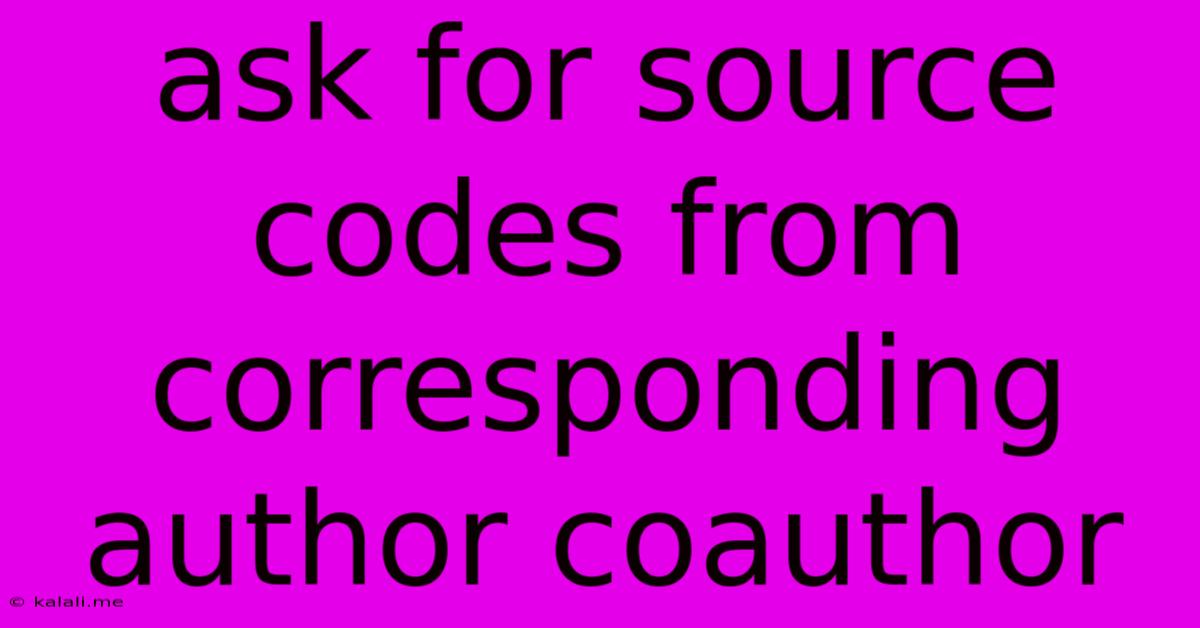Ask For Source Codes From Corresponding Author Coauthor
Kalali
May 23, 2025 · 3 min read

Table of Contents
Asking for Source Codes from Corresponding Authors and Co-Authors: A Practical Guide
Requesting source code from researchers can be crucial for reproducibility, verification, and further development of scientific findings. However, navigating this process requires sensitivity and understanding of academic etiquette. This guide provides a practical approach to obtaining source code from corresponding authors and co-authors. This article covers best practices for making the request, handling potential refusals, and promoting transparency in scientific research.
Why Request Source Code?
The ability to access and examine the source code underlying published research is vital for several reasons:
- Reproducibility: Verifying the results and ensuring the methods are correctly implemented. This is a cornerstone of robust scientific practice.
- Verification: Identifying potential errors or biases in the original analysis.
- Further Development: Building upon existing work, adapting methods to new datasets or contexts.
- Understanding Methodology: Gaining a deeper understanding of the implemented algorithms and techniques.
- Educational Purposes: Using the code as a learning tool for students and researchers.
Crafting Your Request: A Step-by-Step Approach
A well-crafted email significantly increases your chances of a positive response. Consider these points:
- Identify Yourself: Clearly state your affiliation, research interests, and your reason for requesting the code. Be upfront about your intentions (e.g., verification, adaptation, educational purposes).
- Be Respectful and Professional: Address the corresponding author or co-author formally and respectfully. Acknowledge their time and effort in conducting the research.
- Specify the Publication: Clearly mention the specific publication (journal, conference, etc.) and, if possible, provide a DOI or link.
- Explain Your Needs: Articulate your reasons for requesting the code concisely and persuasively. Highlight the potential benefits of sharing the code for the broader scientific community.
- Be Realistic: Don't expect immediate access. Researchers often have competing priorities. Allow for a reasonable response time.
- Offer Collaboration (Optional): If appropriate, suggest potential collaboration, especially if your intended use aligns with their research. This can increase their willingness to share the code.
- Respect Data Privacy: If the code involves sensitive data, acknowledge the need for data anonymization or appropriate handling.
Example Email Template:
Subject: Request for Source Code - [Publication Title]
Dear Dr. [Corresponding Author's Last Name],
My name is [Your Name], and I am a [Your Title] at [Your Institution]. I am writing to you because I am highly interested in your work on [Publication Title], published in [Journal/Conference]. The [specific aspect of the research] is particularly relevant to my current research on [your research area].
To ensure reproducibility and gain a deeper understanding of your methodology, I would greatly appreciate it if you could provide me with the source code used in your study. I intend to use it for [explain your intended use: verification, adaptation, educational purposes, etc.].
I understand you may have other commitments, and I would be grateful for any assistance you can provide.
Thank you for your time and consideration.
Sincerely,
[Your Name] [Your Email Address] [Your Affiliation]
Handling a Refusal:
Even with a well-crafted request, you might face a refusal. This can be due to various reasons, including:
- Ongoing Research: The code might be part of an ongoing project.
- Data Sensitivity: The code may involve sensitive data that cannot be shared publicly.
- Code Quality: The code might not be well-documented or ready for external distribution.
- Time Constraints: The researcher may not have the time to prepare the code for sharing.
If the request is refused, politely acknowledge their response and respect their decision. You can, however, express your continued interest in their work.
Promoting Code Sharing in Research:
The scientific community is increasingly advocating for open and reproducible research. By consistently requesting source code and highlighting its importance, you contribute to a culture of transparency and collaboration. Consider participating in initiatives promoting open-source software and data sharing.
By following these guidelines, you can navigate the process of requesting source code professionally and effectively, thereby contributing to a more transparent and reproducible scientific landscape.
Latest Posts
Latest Posts
-
Civicrm 0 Cannot Access Offset Of Type String On String
May 23, 2025
-
An Increasing Function With Zero Derivative Almost Evertwhere
May 23, 2025
-
Android Messenger Spell Check Not Working
May 23, 2025
-
One Second Delay In System Traffic
May 23, 2025
-
1 Foam Board Insulation In Between Block And Stud Wall
May 23, 2025
Related Post
Thank you for visiting our website which covers about Ask For Source Codes From Corresponding Author Coauthor . We hope the information provided has been useful to you. Feel free to contact us if you have any questions or need further assistance. See you next time and don't miss to bookmark.